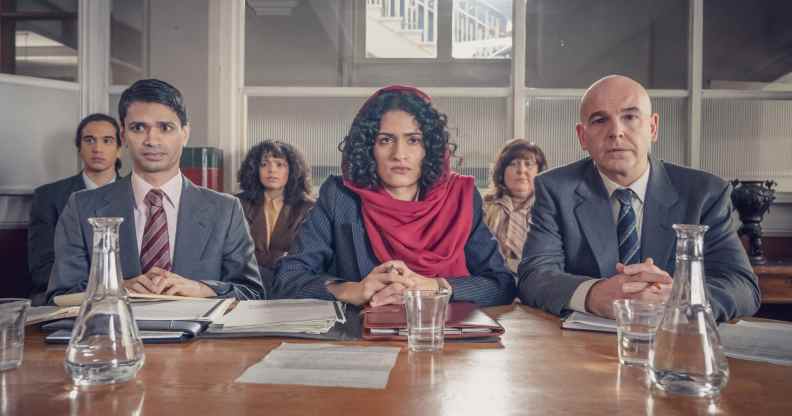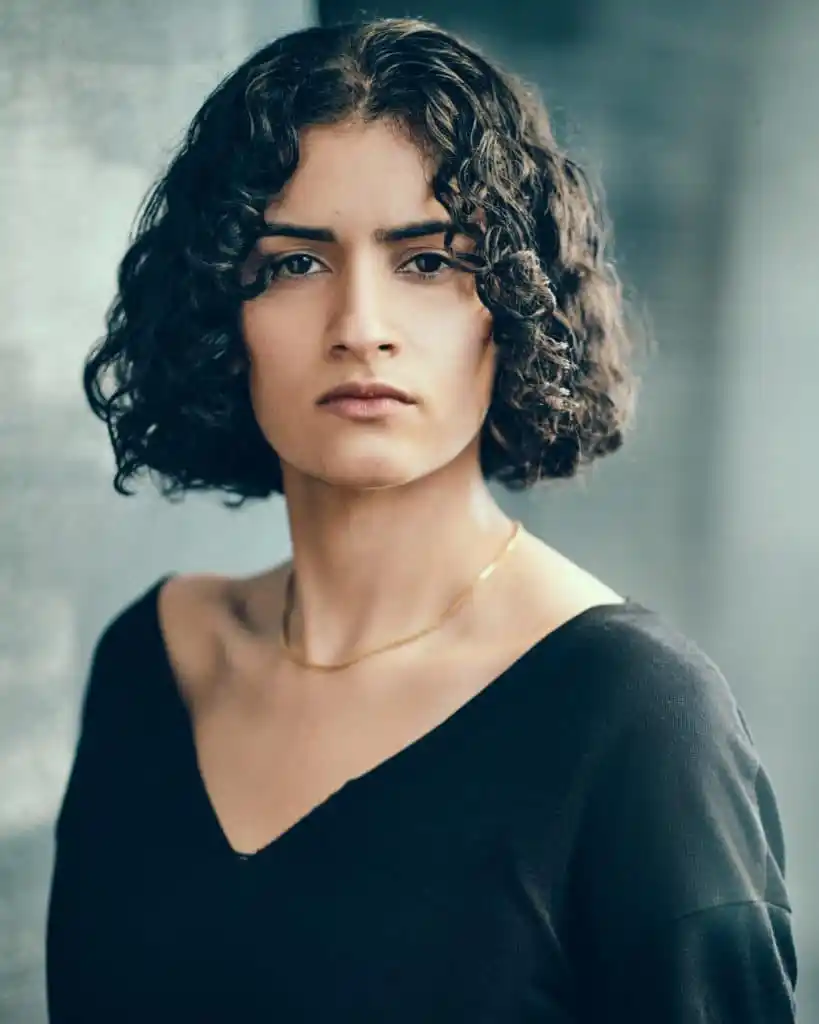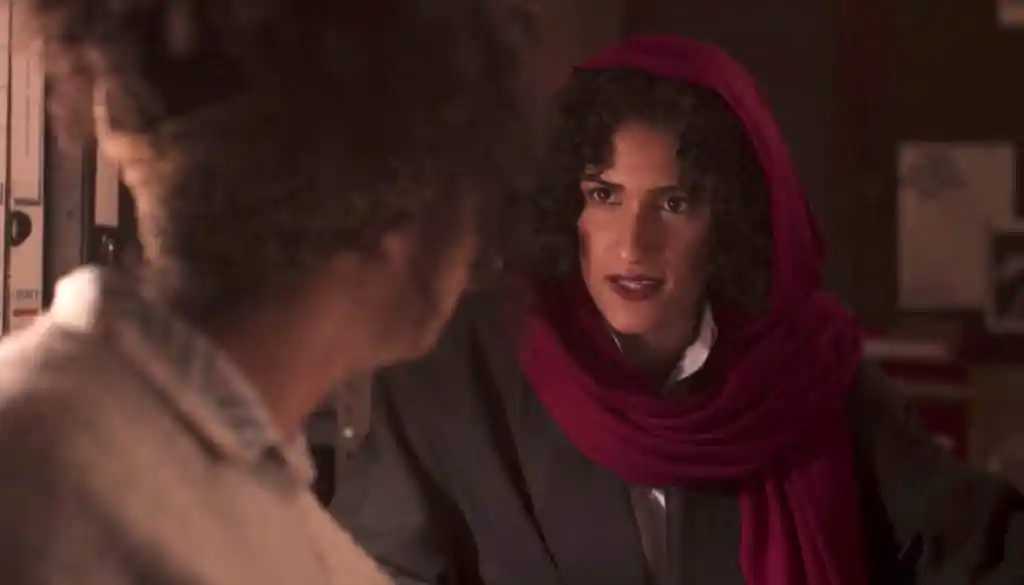It’s a Sin star Seyan Sarvan found Lizbeth with a little help from Lady Hale and fearless, trailblazing women like her

Seyan Sarvan as Lizbeth in It’s a Sin. (Channel 4)
Actor Seyan Servan, who plays Lizbeth Farooqi in It’s a Sin, spoke to PinkNews about representation, stereotypes and how Lady Hale helped her on her journey towards finding her character.
Though it’s the men who are largely front and centre in It’s a Sin, the hit drama also shows how standing right behind them were an army of women who cared and fought for the victims of the AIDS crisis.
One of those women is Lizbeth Farooqi, a powerhouse lawyer who, in episode three, helps to free Colin (Callum Scott Howells) from the stark hospital ward he is being detained.
Lizbeth is a queer Muslim woman, the sort of character that’s rarely – if ever – seen on screens, prompting actor Seyan Sarvan to receive an outpouring of well wishes, applause, and touching messages from young girls who can finally see somebody like them, as she explained to PinkNews.
PinkNews: What was your journey to It’s a Sin?
Seyan Sarvan: It began when Andy Pryor [It’s a Sin casting director] called me in. We’re in an industry where the casting directors, they’re all so lovely, and they’re all led by making sure that diverse representation is brought to our screens, and Andy’s definitely one of those people.
So I went in, and the journey began really with the scripts. I just couldn’t stop reading it – on the tube, everywhere. When people say they binged it, I couldn’t stop reading it. When I saw the description of her – she’s queer, female, and a lawyer in the 80s – I was just so struck by her. Even at the reading, when Russell read that description of her, we all laughed, because it’s like, what a force, there’s no box or stereotype that you can put someone like her in. But also, of course a writer like Russell T Davies would write somebody as diverse as that. Because of course people are as diverse as that.
I’m 26. Initially, it was written as somebody much older. But when I did the It’s a Sin audition, I wasn’t even being pompous, I just knew that it clicked. And I knew that I needed to know more about the story. And before even hearing back – I auditioned Friday got the call Monday that it was booked – before that even happened, I had already begun researching. Because what shocked me is how I never knew about it. I never knew about what happened in the 80s. And I wanted to know, I wanted to feel close to these boys, these young men and what happened to them.
And you know, the reaction to the story is beautiful, because these souls have finally been given a voice. And the reaction to Lizbeth – it’s so touching to get these messages from young Muslim girls from the Asian, Middle Eastern LGBTQIA community who feel so represented.
One of the things that struck me when watching It’s a Sin is that I don’t think I’ve ever seen a queer Muslim woman on British TV before.
Yeah, that’s what’s really shook people.

Seyan Sarvan. (Supplied)
I’m going to go out on a limb and guess that you don’t get offered many parts like It’s a Sin’s Lizbeth.
No. And I think more so for me as an actor, it’s not even about being offered. The thing that leads me as an actor is doing parts that give a voice to the voiceless. That’s the only thing that draws me in; I’m not interested in playing a stereotype. Because you see that, you see a lot of stereotypes of women, of sexuality and of race, and I’m not interested in playing that.
Even with me – so me and Nathanial [who plays Ash], we’re both from the same place, we’re both of Indian descent, but I don’t look Indian to the eye – the stereotypical version of an Indian. I have encountered a lot of, ‘No, you can’t be Indian, you’ve got to be Latin American, or you’ve got to be this.’ When India is a huge country. It’s really diverse.
So that’s always the key for me, staying away from stereotypes. But also, for me where it begins is that film and TV are so key to visibility. And as a kid, I didn’t see anybody like me – I needed those worlds to escape to, so that I could meet souls that I otherwise wouldn’t get the opportunity to meet in my everyday life. But none of those people looked like me. And then it kind of makes you think, can I even get to those positions? Can I be a storyteller? Can I play these kinds of women? And that’s the gap that I now want to fill for audiences: that yes, you can be that, and the leading woman doesn’t have a stereotype of how to look.
Look what Russell’s done in It’s a Sin: he’s given you a story where the lead guy is a gay man, who in real life is openly gay, his love interest Ash, who’s the heartthrob of it, is played by British-Indian guy. And then the powerful female character is played by a British-Indian woman who doesn’t fall into that stereotype. That’s why we need more writers like Russell.
It gives another layer to the conversation that’s being had about authenticity in casting. When we talk about queer representation, a lot of the time, it’s white gay men…
Yeah, and it’s about all of the LGBTQIA community, it’s about people of colour, people with disabilities, it’s all about minorities and how are they affected within that community. The subject here, at the core of it, is minorities, and people that are marginalised from our society. And entertainment is such a powerful tool. During this time, what are we all doing? We’re all streaming. We’re all watching things during lockdown. So we have that responsibility to give people stories that are diverse and could change a thought in them.
I’m honestly so touched. I know Russell is, as he should be, all the It’s a Sin cast are so touched by it. There are young girls contacting me who are just so grateful for the representation, young Muslim girls who’ve privately messaged me, who wear headscarves, who now feel, oh, I’m normal. That’s what really made me emotional. And of course, when that particular person said normal, what she’s actually saying is that there’s nothing wrong with me. And we have a responsibility to show people that.
I know you did a lot of research to prepare for Lizbeth, tell us more about that.
I started by watching documentaries. There was one from, I think, the mid-70s, it was American, and they spoke about the gay man as if it was some science project: How to spot the gay man and what they could do to you. it was horrific, and that sparked me into looking at human rights and the law and to contacting Lady Hale [former president of the UK Supreme Court]. I emailed her and her assistant got back to me, she then told me what type of human rights lawyers I should be looking for, and told me to contact the Bar Council.
From there I contacted loads of law firms, and I think none of them really believed me, because I was asking to go in and shadow them. But my mum is a lawyer, she connected me to a barrister called Alexander Swain. Through him I met Rehana Popal, who is this country’s first British-Afghan barrister to ever exist, a leading barrister on human rights and the refugee crisis. What struck me abut Rehana was just her power. Even in this time, she’s still spoken down to, working in a very male-dominated industry. She still has to deal with that, but then made me think, s**t, what would Lizbeth have gone through during that time if she’s going through this in the present day?

Lizbeth swoops in when the Pink Palace gang need help to free Colin. (Channel 4)
And then, I went to the Royal Courts of Justice every day for a month, I hired a suit and a coat from a place in Leicester Square, I even bought the little gold signet pinky ring – it’s hilarious how people treat you when you dress differently, that will always stay with me. When I was there, when you would see a barrister that was a person of colour, it really stuck out. We’re a very progressive country, we’ve got all these law books on how to protect people, but then you have a minority person who hasn’t always been protected by the law, in that place, it’s a wow moment.
The next port of call for me was a hospital that’s mentioned in It’s A Sin, the Royal Free Hospital, and I met with professor Margaret Johnson, who created one of the first wards for AIDS patients. What struck me was that nobody had sought her out before to talk to her about that time period. Of course, she’s probably spoken about it in her personal life, but for 30 plus years nobody approached the subject with her. And that shows how the conversation becomes stagnant, how it stopped. From both of these women, I saw a heavy drive to want to help, and that was kind of the base of Lizbeth.
She is a fictional character, she’s not based on any one specific person. But what Russell said, what really stayed with me, is that she represents all the women who did such great work. During that time we [women] were there, we were allies, we were involved. And it also a call to the future, she’s very transgressive for that time, she represents what’s to come. And how powerful is that for a young girl whose watching, that it’s the women who’s doing the rescuing?
Do you think that there’s enough of that allyship today between men and women, or between any of the sometimes disparate groups that come together to form the LGBT+ community?
I was actually speaking about this yesterday, and I think, within the LGBTQIA community, there is still like, with each of the groups, there is this this distance. Like yesterday, in an interview, one of the women that was interviewing me, she spoke about the biphobia that she receives. Even though we have a community that’s been so repressed, and so isolated, people still somehow have hateful speech towards each other and this rhetoric. But it’s about us knowing if we know what it feels like to be treated as other and to be pushed away, we should then have compassion with anybody that’s different from us. And always just take a breath and remember that everyone’s different, everyone loves differently, and just how we want that same understanding, to give that to everybody within our community.
Allyship, I think, is definitely there, and it’s increasing. As we increase the conversation, the dialogue, as It’s a Sin has done, people begin to see how it affects them. This subject doesn’t just affect the gay community, it affects everyone at large. Because the heart of the story, what it’s is basically saying, is how do you treat people when they’re different to you? You don’t understand them, they need you, they’re suffering. How do you treat them?
You said it’s about telling stories for you, are there any other stories or topics that you’d like to explore in future roles?
My next project, my first feature film, is coming out at the end of this year and is called Spin State. And that looks at mental health, and explores our grasp of reality. It’s about a private investigator who’s having these blackouts, and then he meets Dana, a scientist, who’s me. And through her research of quantum physics, she discovers what reality really is. And he’s not having a breakdown, he’s just finally seeing what it is.
I think during this time films like that are important, on what reality is, how we make it for ourselves and the healthiness of it, and mental health. In terms of projects that I’d be interested in doing, the things that I’m getting called in for, which I’m so grateful for, I’m drawn to action roles, powerful women – I’ve done so much combat training. And continuing to represent minorities on screen, unheard stories. That’s the real, real key for me in mainstream media.
Obviously It’s a Sin is a complete story, but if Russell ever decided to bring Lizbeth back – maybe in the way he brought Hazel from Queer as Folk back in Cucumber – would you like to revisit her?
Oh, of course, like, I’ve seen it on Twitter, so many threads asking for a series about her. I’m so touched by that, and of course, of course I would. She’s just such a beautiful character, I did so much on her and I was so connected with her. So of course. And who wouldn’t want to work with Russell again, he’s a friend, and I would love that.
And last question – for people who’ve finished It’s a Sin and want more, are there any great queer stories you’d recommend?
All of Russell’s stories are great – Queer as Folk of course. But the classic one, I’m obviously going to say The L Word. That’s the one to binge. I can remember, I think I was in year seven or year eight and I was on the bus to school, and I saw a huge billboard of The L Word. And I work got home and I YouTubed it, and I secretly watched it. That was the only thing around then, and it’s beautiful now when I get contacted by people who are in school, and they say oh my god, it’s so amazing to watch this for that representation. But for me, that was the only thing.

